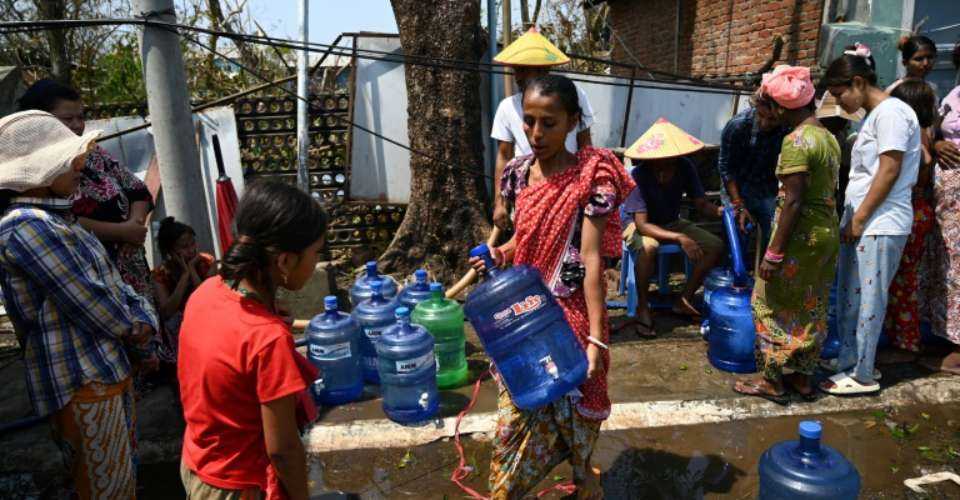
People in Sittwe, the capital of Rakhine state in western Myanmar, queue for water and rice on May 17, 2023, in the aftermath of Cyclone Mocha's landfall. (Photo: AFP)
An acute shortage of water due to prolonged drought, record hot weather and water-borne diseases left at least 83 people dead and scores ill in about 50 villages of western Myanmar, says a report.
People in villages across Rakhine state have made desperate appeals for help as water sources, including ponds and canals, have dried up due to extremely hot weather, Radio Free Asia (RFA) reported on May 14.
Many of the deaths were reported in camps for internally displaced people (IDPs) uprooted by ongoing conflict between the military junta forces and ethnic rebels.
An unnamed resident of Ponnagyun village told RFA that two to three ponds in the village dried up this year, making it significantly challenging for the villagers to get drinking water.
“Some people don’t even bathe regularly and sometimes even lack drinking water. There are some aid groups donating water, but it’s not enough because most villages need it,” the villager said.
Some of the residents were reportedly suffering from diarrhea from drinking dirty water.
Three deaths were reported at the IDP camp in Ah Htet Myat Hle village in April this year.
Aung Myint, a camp official, said hundreds of people were suffering from various symptoms of the diseases caused by consuming unclean water.
“Three people from the camp have died from the disease[s]. It is caused mainly due to unclean drinking water, rising heat, and the toilets,” Myint said.
“We are already having a lot of trouble in the camp. Hundreds of people are suffering from diarrhea. My child is also suffering from it, too,” Myint added.
A source confirmed that nearly a quarter of the households in Ah Htet Myat Hle village’s camp face water shortages.
Most of the IDP camp residents are ethnic Rohingya Muslims, RFA reported.
They have been mainly displaced en masse in Rakhine state due to fighting between junta forces and ethnic minority insurgents from the Arakan Army.
Most camp residents do not have access to primary healthcare, including doctors and sanitation facilities.
Rakhine State’s junta spokesperson, Hla Thein, did not respond to media inquiries about the water crisis.
There were an estimated 1.09 million Rohingya in Rakhine State who were not enumerated in the 2014 census, according to a government report on religion released in July 2016.
Diplomats estimate that more than 100,000 Rohingya remain in the three major townships of Maungdaw, Buthidaung, and Rathedaung in the northern part of the state.
However, The Irrawaddy reported in 2023 that only 79,000 Rohingya are still living in the state. It cited statistics provided by the local General Administration Department (GAD).
Despite living in Rakhine for centuries, Rohingya are viewed as illegal immigrants from Bangladesh and denied citizenship and fundamental rights in Myanmar.
The community has faced persecution at the hands of the military and also Rakhine Buddhists for generations.
Media reports suggest that about 120,000 Rohingya are confined in IDP camps in Rakhine state and another 150,000 are spread in various townships in the state.
A brutal military crackdown in 2017 forced more than 700,000 Rohingya to cross the border into neighboring Bangladesh, where they live in large, overcrowded refugee camps.


